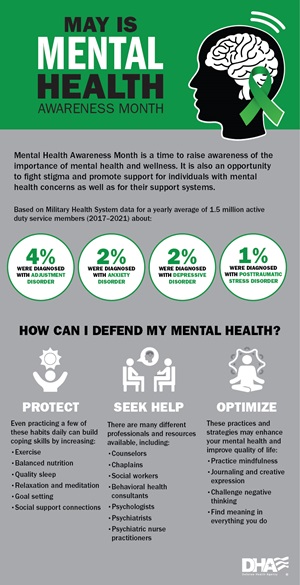By Kimmy Giacalone, MPH
May 4, 2023

PHCoE Graphic
If there’s any piece of advice my parents offered me that actually stuck, it is this—practice what you preach. The concept is simple at its core—act in accordance with how you expect or advise others to act. If you expect your coworkers to be punctual, you should be on time to meetings; if you advise your friends to be kind to themselves, practice the same patience with yourself. While this does seem straightforward, it is sometimes a difficult concept to put into action.
Recently, the COVID-19 pandemic provided the world with an overwhelming sense of what it felt like to be alone. The isolation that the virus thrust upon us left people dealing with depression, anxiety, and other various mental health issues. Despite being so deep in these holes ourselves, many climbed out to step into roles as dutiful and compassionate friends and family members, often offering up time to support our loved ones who were also struggling. While we became sources of comfort and solace to others, many of us did not heed our own advice of “talking to someone” or “taking a walk” or even “buying the fancy chocolate.”
The military is all too familiar with the practice of extending support to others. Common mantras include “service before self,” “take care of your people,” and “promise to protect.” This idea of taking care of your fellow solider, sailor, Marine, airman or guardian is essential in an environment where mental health struggles are a severe issue. According to a recent meta-analysis, depression was prevalent in 21% of active duty or in-service military. The rate of depression was still high in veterans at 19%1. It certainly seems crucial to have a system in place that encourages fellowship and care for others.
Nevertheless, a person can only extend themself so far. How can you advise your coworker to seek the help of a counselor while still dealing with the trauma from your last deployment? This same compassion that you extend to others cannot end at your own doorstep. You need to practice what you preach and defend your own mental health.
So, how can you do this?
- Be Aware—The first proactive measure in defending your mental health is being aware of it
- Protect—Protecting your mental health entails integrating habits into your life that can serve as healthy coping mechanisms, including:
- Exercise
- Balanced nutrition
- Quality sleep
- Relaxation and meditation
- Goal setting
- Social support connections
- Seek help—There are many different professionals and resources from which you can seek help, including:
- Optimize—Incorporate practices that may enhance your mental health and improve your quality of life, including:
- Practicing mindfulness
- Journaling and creative expression
- Challenging negative thinking
- Finding meaning in everything you do
References
- Moradi, Y., Dowran, B. & Sepandi, M. (2021). The global prevalence of depression, suicide ideation, and attempts in the military forces: a systematic review and Meta-analysis of cross sectional studies. BMC Psychiatry, 21, 510. https://doi.org/10.1186/s12888-021-03526-2
Kimmy Giacalone is a contracted scientific data analyst at the Psychological Health Center of Excellence. She supports the Surveillance Branch, analyzing DOD psychological health data to identify the most vulnerable populations and provide recommendations and interventions.